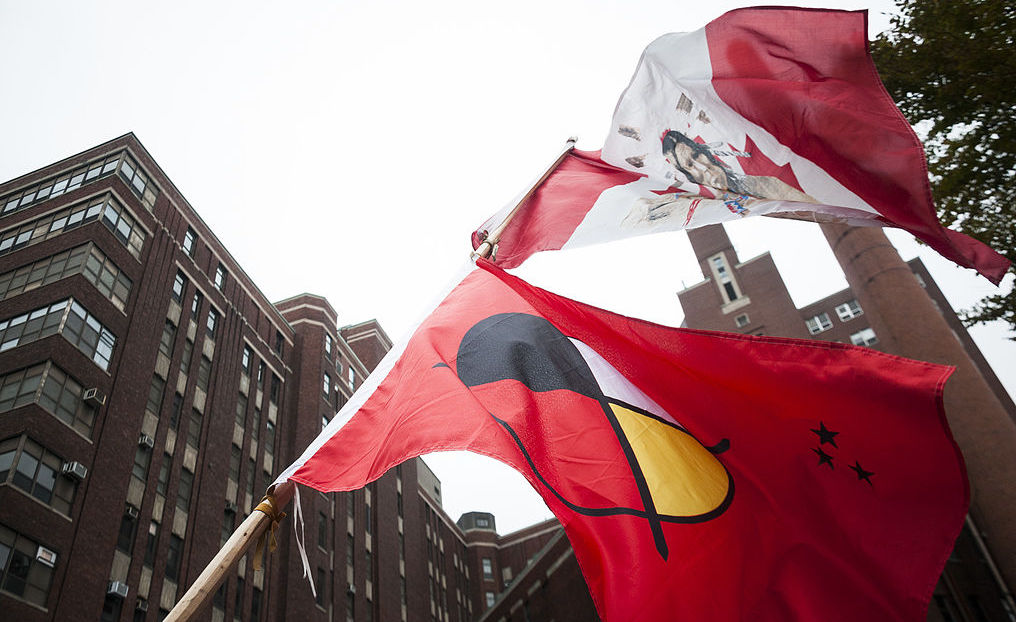A union brought National Aboriginal Day celebrations to Estevan, Saskatchewan for the first time this year.
Members of CUPE 5999, which represents health-care workers across Sun Country in the south-eastern part of the province, hosted a free barbecue in the town’s Centennial Park on Wednesday. The local’s Aboriginal committee organized the event. Elders from nearby Pheasant Rump Nakota First Nation brought a teepee, bannock and an art display. Métis dancers and dancers from Pheasant Rump Nakota First Nation performed.
Jodi Gosselin, chair of the Aboriginal committee, told rabble.ca before the event that she hoped it would show Canadians that Indigenous cultures are important to celebrate. She hoped Indigenous community members would see Estevan as a welcoming place.
Gosselin knows that isn’t always the case. She experienced verbal and physical racism growing up in the community because she’s Métis — and she still sees racism there today.
She’s dedicated to educating people about the value of Indigenous culture. Gosselin’s been involved in CUPE for more than a decade. She’s taught mandatory education about Indigenous people and cultures to new employees, and because of that was asked to get more involved. She helped restart the local’s Aboriginal committee about a year ago. She’d been involved with it previously, but the committee had disbanded because of low interest. Gosselin approached the executive about starting it up again when she saw increased interest.
Gosselin was right. Local president Wanda Edwards said that bylaws were changed so five people could be on the committee, instead of the regular three. Celebrating National Aboriginal Day was one of its priorities, as is collecting information about how many of the local’s 1,200 to 1,500 members identify as Indigenous.
Gosselin, also a member of CUPE’s National Aboriginal Council, said she’s “pretty much addicted” to this work, and would continue working on the local’s Aboriginal committee if it continues.
“Right from the beginning of our market economy, Indigenous people played a really important role,” said Lynne Fernandez, who holds the Errol Black Chair in Labour Issues at the Canadian Centre for Policy Alternatives in Manitoba. Fernandez, along with University of Winnipeg professor Jim Silver described the history of Indigenous people in labour in their paper “Indigenous People, Wage Labour and Trade Unions: the Historical Experience in Canada,” released earlier this year by the Canadian Centre for Policy Alternatives.
The paper details how Indigenous people were critical to establishing Canada’s capitalist economy across the country. At one time, most of the paid workers in British Columbia were Indigenous, working in canneries, mines, mills and as domestic workers, often travelling long distances to urban centres for jobs. In 1887, the majority of employees in Manitoba’s two largest fishing companies were Indigenous. (Though, as the article notes, some Indigenous people didn’t support commercial fishing, concerned about how it would impact their way of life.)
Indigenous people were active unionists. Indigenous fishermen supported strikes along the Fraser River in 1893. In 1906, longshoremen played a key role in forming a local of the Industrial Workers of the World. By the 1950s, nearly half of Kahnawake Mohawk high steel workers in Quebec were union members.
Yet, Indigenous workers were often replaced by Chinese or Japanese workers. Fernandez and Silver’s paper suggests this was partly because Indigenous workers also relied on sustenance work; they didn’t always need paid labour. This made Chinese and Japanese workers easier to control, the paper suggests. In other regions of Canada, employers would hire white settlers instead.
The 150th anniversary of Confederation and the findings of the Truth and Reconciliation Commission give everyone in Canada a chance to reflect on what reconciliation with Indigenous people means, she said.
“It’s up to us to figure out what to do about these injustices, because they’ve given us so much, but the legacy for them has not been just, has not been fair,” said Fernandez. “Not only have we taken everything away from them, but we have not acknowledged the contribution that they’ve made to our modern society.”
Unions haven’t always helped, either. The paper describes how union activities sometimes restricted Indigenous people’s employment, like fighting subcontractors, many of who hired Indigenous workers. But Indigenous people also oppose unions at times — there’s a reason Fernandez and Silver’s paper describes the relationship between unions and Indigenous as “mixed.” Some Indigenous leaders go to court to oppose unionization of workers at some businesses, like casinos, on reserves. And, the paper notes, some Indigenous people view unions as another form of colonialism.
Gosselin said she’s heard Indigenous leaders describe their “fear” of unions. They’re concerned unions are just another colonial agent, or they’re worried they won’t be able to pay chief and council on reservations if they become unionized.
Fernandez said that colonialism isn’t the only reason Indigenous workers may not be involved with unions. Few workers are engaged with their unions, regardless of whether or not they’re Indigenous, she said. She and Silver are preparing a report about experiences of Indigenous workers in CUPE 500, the local representing Winnipeg city workers. Only 15 Indigenous workers participated, she said. Racism was a theme, she said, but the workers said they were “broadly supportive” of unions and knew they had more protection in a unionized workplace than a non-unionized one.
Unions need to promote equality for Indigenous people inside and outside of the workforce, she said, but they can’t force employers to change how they think and what they do. Unions can make recommendations, she said, but employers have to decide if they’re going to act on them.
Meagan Gillmore is rabble.ca‘s labour reporter.
Image: Mathieu Côté/Wikimedia Commons
Like this article? rabble is reader-supported journalism.




